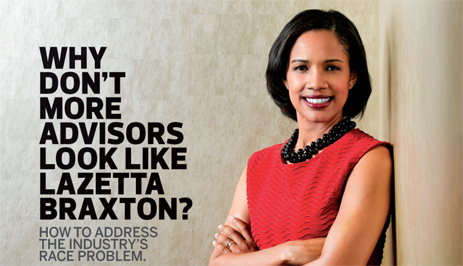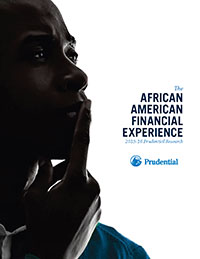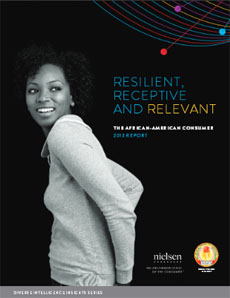Teaching African Americans to Budget, Save and Plan for the Future

NBCI Search
NBCI Featured Program

Why Don't More Financial Advisors Look Like Lazetta Braxton"? - How to Address the Industry's Race Problem More black families are entering the economic mainstream, have more income and are saving for college and retirement.... They need advice and [the financial services industry] is passing up millions of dollars by not reaching out to them. -Rev. Anthony Evans

How to Find
a Job in a Recession
See tips from the experts.
Job Search
Roundup
Tips for a successful
job search
NBCI Feature Article
 It used to be that our personal finances were so uncomplicated -- a simple bank account, 30-year mortgage, company pension.
It used to be that our personal finances were so uncomplicated -- a simple bank account, 30-year mortgage, company pension.That was then.
This is now: Our personal finances come with frustration, complication and financial products that seem incomprehensible. Just trying to understand -- and remember -- the new consumer protections for credit cards is enough to give yourself a headache.
Michelle Singletary
NBCI's 23 Financial Lessons
LESSON 1Here's help for the first -- and often the hardest -- step in achieving your financial goals: deciding which goals to pursue. LESSON 2How to bring your spending under control, so that you get the most out of every dollar. LESSON 3Here's how to get the best banking services at the best price, either online or off. LESSON 4An introduction to making money in stocks, bonds and mutual funds. LESSON 5The market can be a great place to turn savings into wealth -- or to lose your shirt. Here are some fundamentals of investing wisely. LESSON 6It's a mutual-fund jungle out there. Here's how to create a simple portfolio that works. LESSON 7Bonds can provide a steady and reasonably secure income, while adding ballast to your portfolio--but only if you really understand what you're buying. LESSON 8Owning your home is part of the American Dream, but if you're not prepared, buying it can be a nightmare. Here are some fundamentals for buyers and sellers. LESSON 9You've got to know when to hold debt--and when to fold it. This lesson shows you how to accomplish your financial goals by making debt work for you. LESSON 10More companies are handing out stock options, and to a much broader group of employees. This lesson gives you vital information on how to handle ESO's. LESSON 11It's not rocket science, just common sense. By starting early and investing regularly, your children may have a wider choice of colleges, and paying the bill won't hurt as much. LESSON 12Up until they start earning a living, and sometimes well beyond that, kids are apt to spend money like it grows on trees. This lesson will help you put your children on the road to handling money responsibly. |
LESSON 13Achieving a comfortable retirement in the 21st Century requires a new approach to retirement planning. LESSON 14The single most important thing an investor can do is practice asset allocation. Here's how. LESSON 15What to keep in mind when when seeking professionals to handle your financial planning, stock trading, insurance coverage and tax returns. LESSON 16Whether your employer provides you with a group medical plan or you need to buy coverage on the individual market, understanding how health insurance works is the best way to get your money's worth. LESSON 17Buying a car is like no other shopping experience. The choices seem to be endless. This lesson helps you sort through your options. LESSON 18Among the long list of necessary evils we must encounter throughout our lives, perhaps the most constant -- taxes -- is also the least understood. But the whole process isn't nearly as baffling as you may think. LESSON 19Homeowners' insurance can be a nightmare. It's costly, confusing, and unrewarding -- until you have to use it. Here, you'll learn how to purchase peace of mind now and later. LESSON 20Life insurance is critical to financial planning. It's a necessity for anyone with dependents who would be affected financially by your demise. Yet life insurance is one of the hardest financial products to understand and it's sold by agents who are sometimes more concerned with their commissions than your needs. This Money 101 lesson is all about a better way to buy life insurance. LESSON 21Americans are in the midst of one of greatest inter-generational transfers of wealth in history, yet few of us have done any planning for it. Here's how to start. LESSON 22Auto insurance can be a nightmare. It's costly, confusing, and unrewarding -- until you need it. Here's how to purchase peace of mind now and later. LESSON 23It's the most important tool you've got for retirement. Here's how to make the most of it. |
Here's a Switch: Americans Who Don't Spend
 Grace Case hasn't used a credit card in more than two years. She's given up her cell phone, buying new clothes and toys on a whim, getting her hair colored every month, making big-ticket purchases until they're absolutely needed and going to concerts -- her and her husband's favorite form of entertainment. She shops garage sales, uses coupons and never finds her fridge full of leftovers because she stretches every meal she makes. Her 3-year-old daughter Emily plays with toys that were bought for 10-year-old Adam when he was a toddler. She grows many of her own vegetables, buys meat in bulk and carpools to work. "I'm just managing my budget within the parameters of what I have," she said.
Grace Case hasn't used a credit card in more than two years. She's given up her cell phone, buying new clothes and toys on a whim, getting her hair colored every month, making big-ticket purchases until they're absolutely needed and going to concerts -- her and her husband's favorite form of entertainment. She shops garage sales, uses coupons and never finds her fridge full of leftovers because she stretches every meal she makes. Her 3-year-old daughter Emily plays with toys that were bought for 10-year-old Adam when he was a toddler. She grows many of her own vegetables, buys meat in bulk and carpools to work. "I'm just managing my budget within the parameters of what I have," she said.
Her frugality was forced upon her when the Fulton, N.Y., accountant lost a $60,000 a year salary in 2006 and faced the frightening truth that she was unemployed with $41,000 of credit-card debt, two car payments and a mortgage that her husband's machinist salary alone couldn't cover.
10 Ways Banks Siphon Money From You
 Banking and credit-card consumers need to keep their guard up as financial institutions increasingly impose new fees and charges to balance their books in the wake of the continued economic downturn. Banks and card companies have gone on the offensive in advance of proposed new consumer financial-products protections that the Obama administration is asking Congress to enact. For many consumers, that could mean an unexpected sting on monthly bills.
Banking and credit-card consumers need to keep their guard up as financial institutions increasingly impose new fees and charges to balance their books in the wake of the continued economic downturn. Banks and card companies have gone on the offensive in advance of proposed new consumer financial-products protections that the Obama administration is asking Congress to enact. For many consumers, that could mean an unexpected sting on monthly bills.
Traits Billionaires Have in Common
 Want to become a billionaire? Up your chances by dropping out of college, working at Goldman Sachs or joining Skull & Bones. Are billionaires born or made? What are the common attributes among the uber-wealthy? Are there any true secrets of the self-made? We get these questions a lot, and decided it was time to go beyond the broad answers of smarts, ambition and luck by sorting through our database of wealthy individuals in search of bona fide trends. We analyzed everything from the billionaires' parents' professions to where they went to school, their track records in the early stages of their careers and other experiences that may have put them on the path to extreme wealth.
Want to become a billionaire? Up your chances by dropping out of college, working at Goldman Sachs or joining Skull & Bones. Are billionaires born or made? What are the common attributes among the uber-wealthy? Are there any true secrets of the self-made? We get these questions a lot, and decided it was time to go beyond the broad answers of smarts, ambition and luck by sorting through our database of wealthy individuals in search of bona fide trends. We analyzed everything from the billionaires' parents' professions to where they went to school, their track records in the early stages of their careers and other experiences that may have put them on the path to extreme wealth.
Our admittedly unscientific study of the 657 self-made billionaires we counted in February for our list of the World's Billionaires yielded some interesting results.
5 Kinds of Retailers That Are Discounting Deeply
 Clothiers, restaurants and other vendors are wilting -- and cutting prices -- as they struggle to cope with a slowdown in consumer spending. The upshot for customers is a slew of deals across a variety of sectors. For many stores, the situation is grim. The personal savings rate hit 6.9 percent in May, its highest level in more than 15 years and up from close to zero in early 2008, according to the Commerce Department. At the same time, a steady rise in the unemployment rate is putting downward pressure on consumer confidence; the Consumer Confidence Index stood at 49.3 in June, down from 54.8 in May, according to the Conference Board.
Clothiers, restaurants and other vendors are wilting -- and cutting prices -- as they struggle to cope with a slowdown in consumer spending. The upshot for customers is a slew of deals across a variety of sectors. For many stores, the situation is grim. The personal savings rate hit 6.9 percent in May, its highest level in more than 15 years and up from close to zero in early 2008, according to the Commerce Department. At the same time, a steady rise in the unemployment rate is putting downward pressure on consumer confidence; the Consumer Confidence Index stood at 49.3 in June, down from 54.8 in May, according to the Conference Board.
The combination of tighter wallets and lower confidence is creating a huge challenge for retailers, says Mike Gatti, the executive director at the Retail Advertising and Marketing Association, a trade group that tracks company advertising and marketing strategies. Since the beginning of this year, consumers have focused on necessities like groceries and on value, he says.


